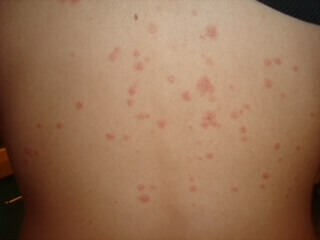
Guttate Psoriasis in Children
Psoriasis is a common skin condition, both in children and in adults. However, guttate psoriasis, is a unique form of psoriasis found in children, and it deserves its own chapter on this website.
The following post was written by the master of the field of dermatology, Professor Danny Ben Amitai.
What does guttate psoriasis look like?
Small, teardrop-shaped rash, slightly elevated, with a silvery scale. The spots, which are usually smaller than 1.5cm, appear mainly on the trunk and limbs, but may sometimes also appear on the face, ears and scalp.
The spots in this rash look very similar to the “regular” psoriasis rash, but they are smaller in size.
What is the cause of guttate psoriasis?
This skin condition usually presents without warning over the course of a few weeks, and it has several potential triggers, including:
• Streptococcal throat infections – sometimes, the carrier state, where there are no symptoms of sore throat or fever, can also trigger it but this is much less common.
• Infectious diseases such as influenza, sinusitis, and respiratory tract diseases.
• Exposure to medications such as beta blockers and anti-malarial medications.
• Stressful events.
How can guttate psoriasis be treated?
Of course, you must start with trying to identify the trigger and treating it or stopping it. Therefore, a throat swab is recommended and if streptococcus is isolated antibiotic treatment should be started. Find out more here about how to take a throat swab for streptococcus here.
When it comes to the rash, if there are relatively few spots, you can treat it with topical medications that contain steroids, vitamin D or calcineurin inhibitors.
If the rash is more widespread, there are two other available therapies that can be considered:
1. Phototherapy – treatment with ultraviolet light rays
2. In severe cases that do not respond to phototherapy – consider treatment with systemic drugs such as methotrexate, and if that doesn’t help – biological treatment.
What about the future?
Keep in mind that guttate psoriasis is a chronic condition with a fluctuating inflammatory process, with certain phases of remission. Some patients will not suffer from it in the future. On the other hand, other patients will have several flares throughout their life, either due to a recurrent streptococcal infection (which caused the initial flare) or in the absence of recurrent infections.
Therefore, it is very important to be monitored by a pediatric dermatologist, so you can be offered the best possible treatment and healing options.
Good luck!
For comments and questions, please register
